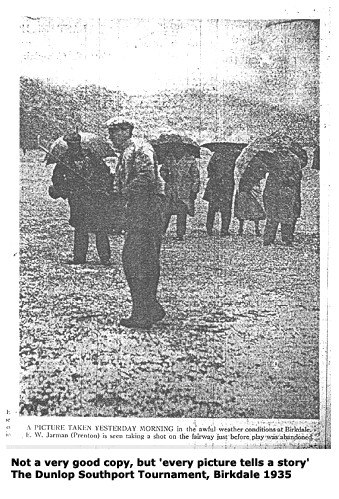|
Astonishingly Cedric Sayner of the host club had managed to score 70
for 17 holes before he was called in. One reporter said that his
uncompleted round was one of the great bad weather performances and
ranked with the round of George Duncan-a famous 76 scored in a
tremendous gale and driving rain to win the first Irish Open at
Portmarnock, Dublin in 1927, during which George was protected by
brown paper under his jacket. Harry Rimmer, the pro from Bidston,
the club adjacent to West Cheshire where I was soon to be based, was
stopped on the first tee – at the top of his backswing. The same
reporter said it reminded him of a navvy with his pick poised to
strike a blow when the dinnertime whistle went.
Bill Davies, never one to hide his feelings, was less than
complimentary about the officials who should have been there that
Friday morning, but chose to be elsewhere. He had fought his way
through the blizzard to the bitter end but could take no further
part - his mother’s funeral took place on the following day. Henry
Cotton, having birdied the first, was only too glad to walk in from
the second. He joined the chorus of protests about the absurdity of
starting in such conditions. It must have ranked amongst the most
farcical rounds of golf ever played. A quick thaw allowed play to be
completed on the Saturday, with a much-depleted field, and I
finished in 14th place.
The winner of this most remarkable event was Charles Whitcombe.

There were also some unusual events in the final of the Amateur
Championship at Royal Lytham. American Lawson Little took a bath
after the first 18 holes and arrived on the tee 18 minutes late for
the afternoon round. His opponent, the 1927 champion, Dr. William
Tweddell from Stourbridge, did not object and Little escaped
disqualification going on to win by 1 hole. In that championship an
American – Capt. A. Bullock-Webster used a very unusual way of
keeping still on the greens. He putted with a cross-legged stance. A
lot of military men entered the championship in those days and
another in the field was one of the great characters of British
golf, Brigadier General Critchley, a Captain of the R&A. He was the
father of Bruce, the well-known journalist and commentator.
L.G.Crawley went out in the early rounds, but that year he won the
Scratch Prize in the Medal competition that preceded the Irish
Amateur at Portmarnock with a very fine 72 over the difficult links
in windy conditions. It was three better than the scratch for the
course. Playing off +2, his nett 74 also gave him a share of first
prize in the handicap section.
NEXT |

